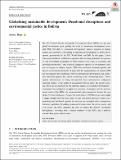Files in this item
Globalising sustainable development : decolonial disruptions and environmental justice in Bolivia
Item metadata
| dc.contributor.author | Hope, Jessica | |
| dc.date.accessioned | 2020-07-01T13:30:01Z | |
| dc.date.available | 2020-07-01T13:30:01Z | |
| dc.date.issued | 2020-05-05 | |
| dc.identifier | 268688108 | |
| dc.identifier | d76412b0-5a93-4378-8799-6a879d30a1ed | |
| dc.identifier | 85086381405 | |
| dc.identifier.citation | Hope , J 2020 , ' Globalising sustainable development : decolonial disruptions and environmental justice in Bolivia ' , Area , vol. Early View . https://doi.org/10.1111/area.12626 | en |
| dc.identifier.issn | 0004-0894 | |
| dc.identifier.other | ORCID: /0000-0002-8726-8880/work/82788912 | |
| dc.identifier.uri | https://hdl.handle.net/10023/20186 | |
| dc.description | This paper has been funded by a Royal Geographical Society (with IBG) Environmental and Sustainability Grant and by a Vice‐Chancellor's Fellowship at the University of Bristol. | en |
| dc.description.abstract | The 2015 United Nations Sustainable Development Goals (SDGs) are the new global development goals guiding the work of mainstream development actors until 2030. The shift to “sustainable development” marks a response to climate change and constitutes a rebranding of international development as global development, prominently by the UN, World Bank, and IMF. In this paper, I draw from recent fieldwork in Bolivia to question what is being globalised. In response to calls for northern geographers to better attend to new forms of coloniality and knowledge production, I take seriously indigenous agendas for development, land, and sovereignty to critique Agenda 2030 with decolonial territorial agendas and theories of environmental justice. I argue that the implementation of Agenda 2030 has reconfigured the borderlands between international development and indigenous territorial agendas. In a drastic reworking of the “boomerang effect,” development infrastructure is being disconnected from anti‐extractive indigenous territorial politics, as the modes of engagement between states, the private sector, and NGOs are reconfigured by the unifying agenda of sustainable development – weakening both indigenous struggles for territorial sovereignty and the environmental remit of the SDGs. An environmental justice perspective locates the case of the Territorio Indígena y Parque Nacional Isiboro (TIPNIS) Secure case within a bigger struggle between local claims to land and global extractive capital, foregrounding that decolonial agendas for territory are entangled with contemporary extractive capitalism. In seeking consensus between states, the private sector, and civil society, the SDGs minimise the sites of conflict that instruct “sustainable development,” revealing both a critical weakness of the SDGs and a pathway towards their greater effectiveness. | |
| dc.format.extent | 9 | |
| dc.format.extent | 246086 | |
| dc.language.iso | eng | |
| dc.relation.ispartof | Area | en |
| dc.subject | Bolivia | en |
| dc.subject | Decolonisation | en |
| dc.subject | Extractivism | en |
| dc.subject | Global development | en |
| dc.subject | Sustainable development | en |
| dc.subject | Territory | en |
| dc.subject | G Geography (General) | en |
| dc.subject | Geography, Planning and Development | en |
| dc.subject | E-DAS | en |
| dc.subject | SDG 13 - Climate Action | en |
| dc.subject.lcc | G1 | en |
| dc.title | Globalising sustainable development : decolonial disruptions and environmental justice in Bolivia | en |
| dc.type | Journal article | en |
| dc.contributor.institution | University of St Andrews. School of Geography & Sustainable Development | en |
| dc.identifier.doi | https://doi.org/10.1111/area.12626 | |
| dc.description.status | Peer reviewed | en |
This item appears in the following Collection(s)
Items in the St Andrews Research Repository are protected by copyright, with all rights reserved, unless otherwise indicated.

